5+ SAMPLE Summary Valuation Report
-
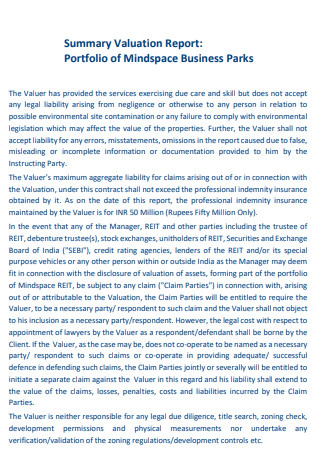
Summary Valuation Report of Portfolio of Mindspace Business Parks
download now -
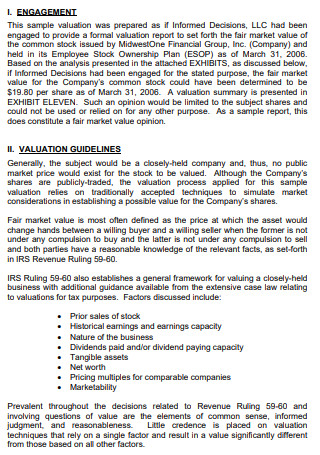
Summary Valuation Report
download now -
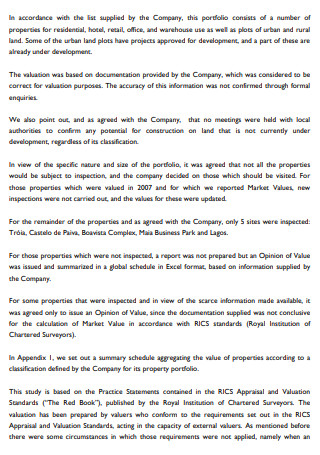
Summary Valuation Report of Capital Property Portfolio
download now -
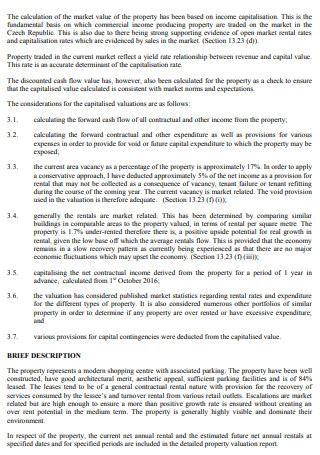
Summary Valuation Report Template
download now -
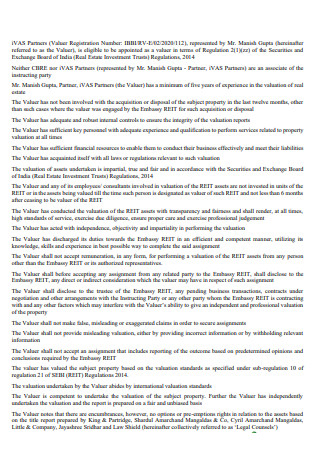
Final Summary Valuation Report
download now -
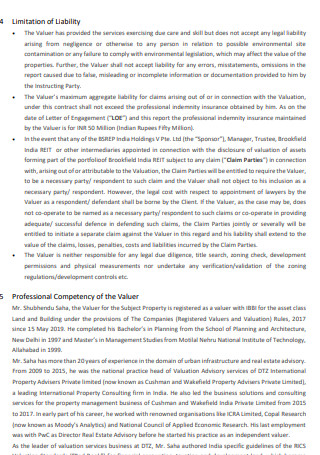
Summary Valuation Report of Real Estate Trust
download now
FREE Summary Valuation Report s to Download
5+ SAMPLE Summary Valuation Report
What Is a Summary Valuation Report?
Necessary Business Reports
Importance of a Valuation Report
How to Write a Summary Valuation Report
FAQs
What is the purpose of the valuation report?
What is the purpose of an executive summary in a valuation report?
What are the other types of valuation reports?
What Is a Summary Valuation Report?
A summary valuation report provides a value conclusion using a condensed version of the material that would be presented in a complete study. A summary valuation report document lacks the degree of information seen in a full analysis. The valuation analyst is still expected to do substantially the same investigation and analysis that is necessary for a thorough valuation report in this report; however, the parties want to decrease the customary appraisal load of creating a detailed valuation report. When a full valuation report is not necessary, this report is generally a more cost-effective method of business appraisal. You may want to check out the sample valuation report of a company to get a better understanding.
Necessary Business Reports
It’s difficult to manage and expand a company if you don’t have visibility into how it’s operating and where it can improve. That is why business valuation and other types of reports are critical for appraising your company and putting it on the right track. You may see what is and isn’t functioning by studying the information included in various sorts of reports and where you can make changes and modifications. The following items curated in the list below are some of the most popular sorts of reports that business owners find beneficial so it is advisable that you know the difference between them so you can decide which one fits into your business or the situation you are encountering.
Importance of a Valuation Report
A business valuation study provides a range of data and figures regarding a company’s genuine worth or value in terms of market competition, asset values, and income values to the company’s owner. Every company owner should have this information on hand. To illustrate firm development, a business value should be acquired at least once a year. A business valuation will provide you with an accurate evaluation of your company’s current market value. This is a prerequisite for mergers and acquisitions, as well as an excellent approach to planning for future business succession. This makes it plays a huge role in analyzing the growth and profitability of the business you handle.
How to Write a Summary Valuation Report
Writing a summary valuation report may not be as lengthy as other business reports that you may have read or encountered while working within the company since it is just a summary of the actual report. But that does not mean you should skip out on the important details regarding valuation. This article not only provides you with samples and templates but you are also shown the summary valuation report format that contains what is comprised within the said document. With that being said, you can now proceed to the guide below to get started on writing a summary valuation report.
1. Recognize the Valuation’s Objective
The report’s intended application and purpose, such as a gift or estate planning document, a buy-sell agreement, financing, or litigation, should be clearly stated. This section is where you will be able to define what the rest of the content will be about. The value standard, such as market price, fair value, strategic interest, or dissolution value, will be defined by the transaction’s aim. The value standard should be presented in straightforward words. You don’t want to include figures of speech in this document as it is meant to be direct and easily understood by whoever will be reading it.
2. Determine the Basis and Premise of Value
A basis of value is a description of the underlying measuring assumptions of a valuation, and for many frequent valuation applications, these criteria specify the right basis. A premise of value, on the other hand, is a form of assumption or assertion about the most likely set of transactional conditions that may be applied to the subject valuation. In common usage, a premise of value is an assumption or assertion upon which research is founded. This is the section where you will be defining the basis and premise of value for the specific property, vehicle, or business venture you are evaluating.
3. Examine the Past Performance
After you have defined the purpose of the valuation report, you will then be writing out the company’s history. This will include what specific ventures you have encountered and how the results have turned out. The information you placed in this section will then showcase the historic performance of your business helping to display or further align the value you see your business to actual details that back up your claim in previous steps.
4. Analyze Financial Value
Past performance might provide valuable insight into future cash flow. A company’s value is impacted by how well it has performed in the past or how well it has performed in contrast to other firms in the same industry. To arrive at a defined amount of cash flows, modifications to the company’s financial statements are sometimes required to account for discretionary or nonrecurring items, as well as distinctive accounting practices. To correctly assess the future, the report should include a forecast of future operations, or at the very least, a discussion of the company’s expectations for the future.
5. Determine the Valuation Approach to Be Used
This part should include a detailed explanation of which methods were employed on the subject firm and how they were used. This section is critical since different approaches or sets of methods may be used in the same scenario on a frequent basis. This section should give detailed information on the computations that led to the appraiser’s findings.
6. Include Discounts on the Conclusion of the Value Report
The appraiser should describe which discounts are justifiable and why they are reasonable throughout this portion of the valuation report. It should give actual data to support the discount rates that have been established. In addition to traditional sources of valuation evidence such as the transaction history and offers, loan applications, preceding appraisal reports, and rules of thumb, comprehensive reports would provide values derived from unconventional sources of valuation evidence, which will be accommodated against the appraiser’s methodology values.
FAQs
What is the purpose of the valuation report?
The goal of valuation is to assess an asset’s or company’s worth and compare it to the current market price. Valuations for assets or liabilities are conducted for a variety of reasons. A valuation can be useful when attempting to determine the fair value of a security, which is ascertained by what a purchaser is willing to pay a seller, assuming both parties enter the transaction willingly. A valuation can be useful when attempting to determine the fair value of protection, which is determined by what a buyer is prepared to pay a seller, assuming both parties enter the transaction willingly.
What is the purpose of an executive summary in a valuation report?
An evaluation report’s executive summary is a condensed version of the complete report. It emphasizes evaluation results and suggestions while also providing a brief explanation of the evaluation goal, main evaluation questions, and research options employed. An executive summary should summarize the report’s main points. It should restate the aim of the study, emphasize the key issues, and include any findings, conclusions, or suggestions. In this case, for a summary valuation report, it may not be necessary to include it as the contents will be succinct and direct to the point.
What are the other types of valuation reports?
There are various forms of valuation reports and in knowing the difference, you can apply each type much better to the situation you are encountering and the kind of content you are writing. The four types of valuation reports include; a comprehensive report, an estimate report, a calculation report, and a limited critique report.
Whether it is an inventory valuation or stock valuation, having the presence of a valuation report is important to collect and gather information about the value of the possession or business you are holding. The contents may differ but the purpose remains in upholding the value they have with them.
